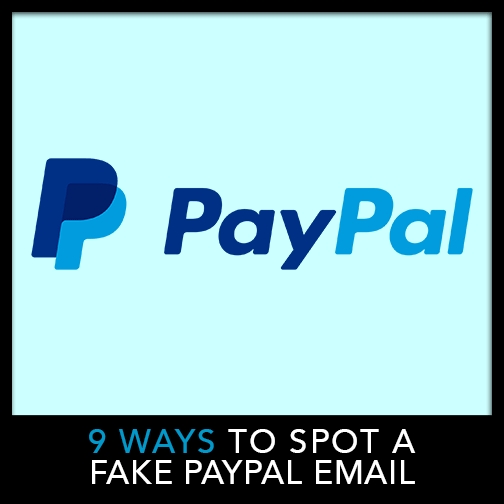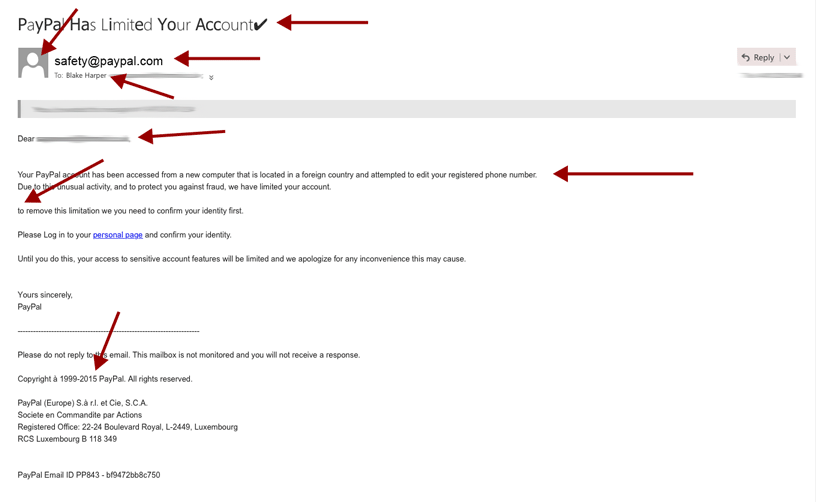
9 Ways To Spot A Fake Paypal Email:
We’re sharing this information because this one nearly had us fooled.
Paypal, as most of you will know, is one of the world’s leading online financial tools, allowing people to pay for nearly everything on the internet as well as providing a platform through which businesses and individuals can easily transfer funds.
With that in mind, this came to our attention as just last week we received an email claiming to be from Paypal, informing us that our account has been restricted after the account was accessed from a foreign country, where the user attempted to change the registered phone number on the account.
It sounded pretty legitimate, after one of our operatives had been tasked to a case in New Zealand at the time and had access to the account.
However, after looking a little closer at the email, we noticed a few things:

- The subject line seemed very strangely formatted, with some letters in bold and others not.
- The image associated with the sender in this email is blank or “anonymous.” Paypal would have an avatar or logo associated with their account.
- Paypal would only address its customers directly – yet the email begins with “Dear xxx@preciseinvestigation.com”, when in fact Paypal would use the customer’s real name.
- The grammar in the first sentence, while seemingly correct, actually makes little sense as it doesn’t properly refer to whom or what “attempted to edit” the registered phone number.
- Paypal is a world leader in terms of it’s professionalism and service standards, as such, there would be no room for error in any of its communications, yet we see that on the third line of the email, the beginning of the sentence starts with a lower case “t.” A typo that Paypal would not fail to spot.
- The email was received in 2016, yet in the signature section, “Paypal” has described its copyright timeframe as “1999-2015.” Another alarm bell.
- After looking at the body of text, we then turned our attention to the recipient information, i.e. us. We noticed that the name associated with our email address was and is most certainly not correct – an immediate sign that this email is fake.
- Doing a quick online check, we found that Paypal does not use safety@paypal.com as a communications email address – there is no information online as to whether emails from this account are fake, but we’re telling you now… it is.
- At first, the email address, safety@paypal.com may seem legitimate, but after you inspect the contact information of the email address itself, we reveal the truth. The user has set their name as safety@paypal.com, when in fact the real email address that the message was sent from is, lisa22@uwclub.net.
And bingo, there we are: 6 sure-fire signs that this Paypal email is a fake. Please share this with anyone you know who may be using Paypal and DO NOT, under any circumstances click on any links in the email whatsoever. Doing so may lead to any number of malicious practices against you, the most common of which may include:
- Ransomware: A program that locks your computer, stating that your access to your machine has been denied and will continue to be until you pay X amount of dollars. Even after victims pay the ransom to release their machines, in many cases the computer remains frozen with the message continuing to appear, asking for more payments. DO NOT PAY.
- Spyware: Another devious plot to gain your personal information, this software buries itself deep in the background of your machine and records everything you do, including the keys you press on your keyboard, the sites you visit and the emails you send. Needless to say, if you ever log into your banks online accounts while this software is in place, they’ll quickly see your account information and the passwords you used to gain access.
- Malware: This can be any generic form of spam, where your computer gets infected with a range of viruses, some of which aren’t particularly harmful to you, but cause your machine to run slower, show a large number of pop-up ads, most of which seem to be pornographic these days, and may even lead to some of your programs malfunctioning or becoming completely unusable.
If you, or someone you know, is on the verge of being scammed in any way, please get in touch with our offices and one of our operatives will be sure to lend a helping hand in assisting you to overcome the associated issues. Australians are fast becoming one of the most defrauded people in the world, with scams reaping billions of dollars from the country every year. Not only in terms of online foul play, but even our streets, and businesses are at risk, and the people who come to work here from overseas too – take 7-Eleven as a prime example.
Otherwise, if there’s anything that’s bothering you about the way things are being done at home, at work or when you’re on the move, and you’d like a professional to step in and give you the feedback you need, just:
Call Precise Investigation today on 1300 856 011 for a discrete, professional private investigation service.
Melbourne, Adelaide, Sydney, Hobart, Brisbane, Perth and even the more remote areas of the country are all within our reach as we have operatives stationed nationwide, with a view to service any and all regions of Australia. Get in touch with us today and see what we can do for you.











